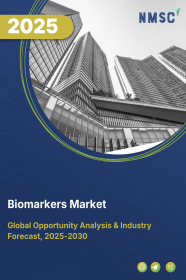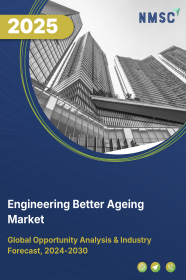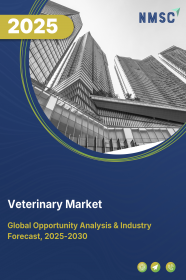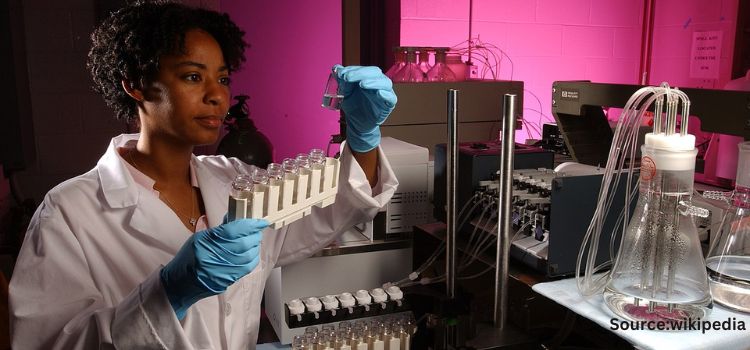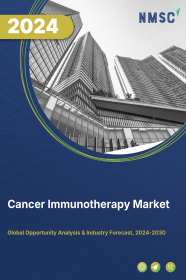
Cancer Immunotherapy Market by Type (Monoclonal Antibodies, Cancer Vaccines, Check Point Inhibitors, and Immunomodulators), by Application (Lung Cancer, Breast Cancer, Colorectal Cancer, Melanoma Cancer, Prostate Cancer, Head Cancer, and Neck Cancer), and by End-User (Hospital & Clinics, Cancer Research Institutes, and Others) – Global Opportunity Analysis and Industry Forecast 2024-2030
Cancer Immunotherapy Market Overview
The global Cancer Immunotherapy Market size was valued at USD 110.21 billion in 2023 and is predicted to reach USD 227.45 billion by 2030 with a CAGR of 10.9 % from 2024-2030.Cancer immunotherapy also known as immune-based cancer treatment market, involves the production, and commercialization of therapies that are utilized for body's immune system to fight with cancer.
This market includes innovative treatments such as immune checkpoint inhibitors, CAR-T cell therapies, monoclonal antibodies, cancer vaccines, and cytokines. These treatments aim to improve the immune system's capacity to recognize and eliminate cancer cells through a specialized method for treating cancer.
The market is defined by investments in research and development, thorough clinical trials, and a strong lineup of new products. With the rise of immunotherapy, the cancer treatment market is poised to undergo a transformation with the introduction of personalized and highly efficient therapeutic options.
Market Dynamics and Trends
The rising incidence of cancer and tumour globally, driven by various factors such as unhealthy life style, increased tobacco and alcohol consumption drives the Cancer immunotherapy market demand for effective treatment including cancer immunotherapy. This therapy enhances the immune system's ability to recognize and attack cancer cells more effectively driving the growth of the market.
As per the report published by World Health Organisation, around 20 million people developed cancer and 9.7 million people lose their lives due to cancer in 2022. With such increase in cancer cases globally the number of people requiring the cancer treatment including immune-based cancer treatment is on rise.
Moreover, the rapidly growing elderly population, who are prone to numerous chronic diseases including cancer and diabetes, further boosts the demand for cancer immunotherapy treatment. As the aging population continues to expand, the incidence of cancer and other chronic conditions rises, leading to an increased need for advanced and effective treatment options including immunotherapy.
According to Union for International Cancer Control, older people are 11 times more likely to develop cancer as compared to younger people. The report also states that around 53% of people dealing with cancer were of age 65 or older in 2022. With this surge in cases of cancer among elderly people, the demand for cancer immunotherapy therapy to fight cancer cells among older adults is on rise, thereby driving the growth of the market.
Additionally, the rising investment for the research and development in healthcare sector by various government across the world drives further boosts the growth of the cancer immunotherapy market. This heightened investment allows the researchers to continuously innovate and improvise the treatment facilities for the better outcome of patients, fueling the growth of the market. As per the report published by the Ministry of Health and Welfare, the total budget for healthcare in India was around USD 10.69 billion in 2023 with around USD 36 million allocated for health research.
Furthermore, as per the Government of Australia, the total budget on healthcare sector in 2022 was around USD 71.9 billion with around USD 10.4 billion allocated towards Medical Research Future Fund. This surge in investment in healthcare sector for the development of advanced treatment facility boosts the market growth. However, the high costs associated with the cancer immunotherapies is the major factor restraining the cancer immunotherapy market growth.
On the contrary, the development of new immunotherapies such as CAR-T cell therapy, checkpoint inhibitors and oncolytic virus therapy is anticipated to create ample growth opportunity in the forthcoming years. These innovative therapies represent significant advancements in the treatment of cancer, offering more targeted and effective options with potentially fewer side effects compared to traditional treatments.
Market Segmentations and Scope of the Study
The cancer immunotherapy market report is segmented on the basis of type, application, end-user and region. On the basis of type, the market is segmented into monoclonal antibodies, cancer vaccines, check point inhibitors, and immunomodulators. On the basis of application, the market is classified into lung cancer, breast cancer, colorectal cancer, melanoma cancer, prostate cancer, head cancer, and neck cancer. On the basis of end-user, the market is divided into hospital & clinics, cancer research institute and others. Regional breakdown and analysis of each of the aforesaid segments includes regions comprising of North America, Europe, Asia-Pacific, and RoW.
Geographical Analysis
North America holds the dominant of the cancer immunotherapy market share and is expected to continue its dominance during the forecast period. This is attributed to the rising incidence of cancer among individuals driven by the poor dietary habits, and rising obesity rates. According to the National Cancer Institute, in 2024, around 2 million people were diagnosed with cancer in the U.S., and around 611, 720 people lose their lives due to cancer. With such increase in the number of cancer cases the demand for effective cancer treatment is on rise driving the growth of the market in this region.
Moreover, the rising R&D investment by the government of various countries in this region for the healthcare sector boosts the market growth. This heightened investment in healthcare sector for research and development allows the researches to innovate and bring most effective treatment for numerous diseases including cancer.
As per the report published by the American Cancer Society, in 2024, the National Institutes of Health (NIH) received USD 300 million to conduct and support medical research, additionally, National Cancer Institute (NCI) a part of NIH received USD 120 million to focus especially on cancer research and training. With such increased investment towards research and development, the advancement in cancer care through innovations in treatment methods is on rise.
On the other hand, Asia-Pacific shows a steady rise in the cancer immunotherapy industry during the forecast period. This is attributed to the presence of high-quality healthcare infrastructure in this region driven by the requirement of standardized treatment for various diseases including cancer. This health infrastructure ensures the advance medical treatments that is effectively delivered and accessed by the patients.
As per the report published by the National Library of Medicine in May 2023, China emerges as the global leader in healthcare sector with over 36,570 hospitals and 977,790 primary clinics. With such extensive healthcare infrastructure in China, the treatment facility and people’s belief for high quality treatment for cancer is on a rise, driving the growth of the market.
Moreover, the rapidly growing elderly population in this region drives the growth of the market. The surge in elderly population coupled with the health condition including cancer due to decline in body's ability to combat cancerous cells creates heightened demand for advanced treatment including cancer immunotherapy.
According to the National Library of Medicine, around 2.3 million people aged 65 or older were detected with cancer in 2020 and expected to reach 2.8 million by 2050 in Japan. This trend highlights the requirement for innovative therapies to address the increasing burden of cancer and improve patient outcome.
Competitive Landscape
Various key players operating in the cancer immunotherapy industry are F. Hoffmann-La Roche AG, Bristol-Myers Squibb Company, AbbVie Inc., Johnson & Johnson, Sanofi, Astellas Pharma Inc., Pfizer Inc., Novartis AG, Merck KGaA, Eli Lilly and Company, and others. These companies are adopting various strategies including product launches to remain dominant in the industry.
For instance, in June 2024, AbbVie launched the Phase 3 CERVINO trial to test ABBV-383, a new type of treatment for relapsed multiple myeloma. ABBV-383 uses special antibodies to help the immune system attack and destroy multiple myeloma cells, marking a step forward in cancer treatment. Moreover, in January 2024, Roche AG received approval from the European Commission for Tecentriq SC, an immunotherapy providing a faster and more convenient treatment option for cancer patients. This new subcutaneous product reduces treatment time from 30-60 minutes required for intravenous infusion to just around 7 minutes, enhancing treatment flexibility and efficiency for patients.
Also, in October 2023, Merk KgaA launched KEYTRUDA (pembrolizumab) and received the Food and Drug Administration approval for the treatment of patients with resectable non-small cell lung cancer. This approval expands the use of KEYTRUDA to earlier stages of lung cancer and represents an important advancement in the field of cancer immunotherapy.
Key Benefits
-
The report provides quantitative analysis and estimations of the cancer immunotherapy market from 2024 to 2030, which assists in identifying the prevailing market opportunities.
-
The study comprises a deep-dive analysis of current and future cancer immunotherapy market trends to depict prevalent investment pockets in the industry.
-
Information related to key drivers, restraints, and opportunities and their impact on the market is provided in the report.
-
Competitive analysis of the players, along with their market share is provided in the report.
-
SWOT analysis and Porters Five Forces model is elaborated in the study.
-
Value chain analysis in the market study provides a clear picture of roles of stakeholders.
Cancer Immunotherapy Market Key Segments
By Type
-
Monoclonal Antibodies
-
Cancer Vaccines
-
Check Point Inhibitors
-
Immunomodulators
By Application
-
Lung Cancer
-
Breast Cancer
-
Colorectal Cancer
-
Melanoma Cancer
-
Prostate Cancer
-
Head Cancer
-
Neck Cancer
By End-User
-
Hospital & Clinics
-
Cancer Research Institutes
-
Others
By Region
-
North America
-
The U.S.
-
Canada
-
Mexico
-
-
Europe
-
The UK
-
Germany
-
France
-
Italy
-
Spain
-
Denmark
-
Netherlands
-
Finland
-
Sweden
-
Norway
-
Russia
-
Rest of Europe
-
-
Asia-Pacific
-
China
-
Japan
-
India
-
South Korea
-
Australia
-
Indonesia
-
Singapore
-
Taiwan
-
Thailand
-
Rest of Asia-Pacific
-
-
RoW
-
Latin America
-
Middle East
-
Africa
-
Key Players
-
F. Hoffmann-La Roche AG
-
Bristol-Myers Squibb Company
-
AbbVie Inc.
-
Johnson & Johnson
-
Sanofi
-
Astellas Pharma Inc.
-
Pfizer Inc.
-
Novartis AG
-
Merck KGaA
-
Eli Lilly and Company
REPORT SCOPE AND SEGMENTATION:
|
Parameters |
Details |
|
Market Size in 2023 |
USD 110.21 billion |
|
Revenue Forecast in 2030 |
USD 227.45 billion |
|
Growth Rate |
CAGR of 10.9% from 2024 to 2030 |
|
Analysis Period |
2023–2030 |
|
Base Year Considered |
2023 |
|
Forecast Period |
2024–2030 |
|
Market Size Estimation |
Billion (USD) |
|
Growth Factors |
|
|
Countries Covered |
28 |
|
Companies Profiled |
10 |
|
Market Share |
Available for 10 companies |
|
Customization Scope |
Free customization (equivalent to up to 80 working hours of analysts) after purchase. Addition or alteration to country, regional, and segment scope. |
|
Pricing and Purchase Options |
Avail customized purchase options to meet your exact research needs. |

















 Speak to Our Analyst
Speak to Our Analyst



